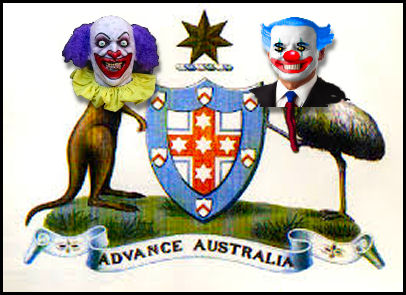 James Sinnamon, an independent candidate for the seat of Brisbane in the forthcoming 2010 Federal elections asks Senator Bob Brown and members of the Greens Party to pledge to introduce into our Federal Parliament bills for Binding Citizens Initiated Referenda, Swiss-style. This would strongly guarantee against politicians ever again being able to abuse their office in order to enact laws overwhelmingly opposed by the people, in the way Senator Stephen Conroy is now attempting to ram his Chinese-style Mandatory Internet Filtering Laws through the Senate.
James Sinnamon, an independent candidate for the seat of Brisbane in the forthcoming 2010 Federal elections asks Senator Bob Brown and members of the Greens Party to pledge to introduce into our Federal Parliament bills for Binding Citizens Initiated Referenda, Swiss-style. This would strongly guarantee against politicians ever again being able to abuse their office in order to enact laws overwhelmingly opposed by the people, in the way Senator Stephen Conroy is now attempting to ram his Chinese-style Mandatory Internet Filtering Laws through the Senate.
See also: "Conroy will be censoring people, not the internet" of 23 Dec 09 on Online Opinion and discussion forum, "Australia's shadowy wisp of a democracy" of 19 Dec 09 on Online Opinion and discussion forum, cir-australia.net, efa.org.au, greens.org.au. See article for links to other articles, on other sites, on Mandatory Internet Filtering. See, on candobetter.org, "Federal Government threatens Internet censorship" of 16 Nov 08, "Stop Internet Censorship!" of 4 Dec 09, "Rudd - just a control freak with his little book or are we witnessing the emergence of the 'Rudd State'?" of 15 Dec 09.
Appendices: Reply from Greens Senator Scott Ludlam, 22 Dec 09 and my further replies.
Originally published 20 Dec 09. Updated with appendix 23 Dec 09.
Dear Senator Bob Brown and all members of the Greens Party,
Australia may be weeks away from having our democracy irreparably and terminally harmed if the Communications Minister Stephen Conroy gets his way and has his Mandatory Internet Filtering legislation passed by the Senate.
This is in spite of the following facts:
- Mandatory Internet Censorship was not put to the electorate in the 2007 elections;
- Opinion polls show consistent overwhelming public opposition to
Mandatory Internet Filtering;
- Senator Conroy has rarely been prepared to defend Internet Filtering in
open public debates and, where he has, he has lost the argument;
Senator Stephen Conroy has obstinately ignored public opinion in order to pursue his goal of imposing on Australian Internet users, a Chinese-style firewall that will give the Government virtually unlimited powers to censor any Internet material it considers a threat.
The ability, that ordinary citizens now have to use the Internet to tell the truth and show up the deceit of the governments and the corporate news media and to organise to rectify Australia's generally woeful current political situation, could well be lost forever.
All that stands in the way of this becoming the reality are the votes of a handful Liberal and National Party Senators.
To their immense credit, the Liberal and National Parties have held the line and prevented this rotten legislation becoming the law until now.
However, can we allow ourselves to forget that many of these are the same people who voted again and again for retrograde legislation such as "Work Choices" and the privatisation of Telstra and for the Iraq War when they were members of the Howard Government? Can we be sure that such political representatives will hold the line indefinitely in the Senate against Mandatory Internet Filtering?
All it needs is for just a few members of the Opposition to change their vote, for this rotten bill to become law. It is not difficult to imagine one or two proclaiming that the imperative of protecting children, as the bill purports to do, as a justification for changing their vote.
And even if the Opposition does hold the line against the Bill, what sort of choice will ordinary voters face at the likely Double Dissolution elections early next year?
The only realistic chance they would have of defeating Mandatory Internet Filtering, would be to embrace, even if only on a two-party-preferred basis, the parties which gave them "Work Choices", the Iraq War, Telstra privatisation and slash-and-burn budgets and which sent Rottweillers and mercenaries into the wharves in an attempt to break the Maritime Union of Australia in 1998.
This is simply not good enough.
If we are to end, once and for all, the kind of elective tyranny that now threatens us with internet censorship, then this country needs a law that gives to any ordinary citizen, if he or she can demonstrate a minimum threshold of public support, the right to initiate a national referendum, the outcome of which is binding upon the national goverment. Such referenda are referred to as Binding Citizens Initiated Referenda (BCIR).
In Switzerland any proposal at the national level supported by a 100,0001 of its 4,915,533 registered voters, including proposals for the recall of any elected official, can be put to the vote at referenda held every three months.
There is no way that the citizens of Australia would have permitted Keating's deregulation of the finance sector, the privatisation of retirement income, the privatisation of QANTAS, the Commonwealth Bank, the Commonwealth Serum Laboratories, the State Banks and State Insurance companies, the imposition of the National Competition Policy, the forcible amalgamation of local governments, the Bligh Government's fire sale, etc. if BCIR had been law.
And there would be no way today that Senator Conroy could hope to get his Mandatory Internet Filtering bill passed today.
The choice we face at the end 2009 is between the continuation of our current system of elective tyranny which may well turn into a totalitarian police state if Conroy's bill is passed, or giving back, to ordinary citizens, the right to determine the course of their country.
If the Greens chooose to emphatically campaign for BCIR laws, as well as against Mandatory Internet Filtering, in the coming 2010 federal elections, there is every reason to expect that at least a firm majority voters will support those policies enthusiastically and that far more of them, than have in past elections, will vote for Greens candidates. As the case for BCIR laws is so clear and overwhelming, this could well cause either or both of the major parties to also promise to support the implementation of such laws to shore up their own electoral support.
Whether they do or not, neither the Greens nor the Australian electorate could lose as a result.
As an independent candidate, who intends to contest the Federal Lower House seat of Brisbane in the coming Federal Elections, I will be putting to Brisbane voters my proposal for BCIR laws. I intend to make known to Brisbane voters and voters in all other electorates the stance, or lack of stance, as it may turn out to be, of each and every candidate on BCIR's and urge them to use their primary and subsequent voting preferences accordingly.
I hope, as result of your receiving this open letter, you will immediately give the BCIR issue the urgent consideration it deserves and that I will soon be able to inform electors through our web site that every successful Greens candidate has pledged to introduce BCIR legislation into our Federal Parliament at the earliest possible opportunity in 2010.
I also hope that affirmative, even if belated, responses, are similarly sent by the Greens to the group CIR Australia, which, in late 2008, surveyed every Parliamentarian and political party in the country about their intentions towards BCIR's. Only two Greens, Nicholas McKim and Timothy Morris from the Tasmanian House of Assembly, have responded so far to that survey. The responses can be found at www.cir-australia.net/index.php?id=12 and www.cir-australia.net/index.php?id=13.
This open letter has been published on our website at candobetter.org/CitizensInitiatedReferenda I intend to also publish there, with their permission, any responses from the Greens as an organisation or from Senator Bob Brown and other individual members of the Greens as soon as I receive them.
Yours sincerely,
James Sinnamon
Brisbane Independent for Truth, Democracy,
the Environment and Economic Justice
Australian Federal Elections, 2010
Footnotes
1. ↑ The 100,000 signatures can be collected in up to a maximum of 18 months. In Australia, this would have been the equivalent to requiring signatures of 277,621 of its 13,646,539 voters registered in 2007. Given Australia's geographic disparity and less than universal access to e-voting a somewhat lower threshold would be justified.
According to the Swiss government web site (24 July 2013 - I am advised: "Document not found! -- The page you were looking for could not be found." - Ed), voters also have the power to rescind legislation carried by their Parliaments:
The people are entitled to pronounce on parliamentary decisions after the event. Federal laws, generally binding decisions of the Confederation and international treaties of indefinite duration are subject to an optional referendum: in this case, a popular ballot is held if 50,000 citizens so request. The signatures must be collected within 100 days of a decree's publication. (www.eda.admin.ch/eda/en/home/reps/ocea/vaus/infoch/chpoli.html , also cited at www.cir-australia.net/index.php?id=24)
Some Further Information
cir-australia.net, efa.org.au, greens.org.au.
For more on Bindng Ditizens Initiated Referenda, see: "Australia's shadowy wisp of a democracy" of 19 Dec 09 on Online Opininion and discussion forum.
For more on Mandatory Internet Filtering, see: "Federal Government threatens Internet censorship" of 16 Nov 08 on candobetter.org, "Save the Children opposes internet filter" of 9 Jul 09 on ABC Online, "Internet filter plan 'wasting time, money'" of 2 Sep 09 on ABC online, "Stop Internet Censorship!" of 4 Dec 09 on candobetter.org, "Undermining the American People's Right to Privacy: The Secret State's Surveillance Machine" of 11 Dec 09 on Global Research, "Rudd - just a control freak with his little book or are we witnessing the emergence of the 'Rudd State'?" of 15 Dec 09 on candobetter.org, "ISP filter to block worst net nasties" in the Australian of 15 Dec 09, "Green light for internet filter plans" of 15 Dec 09 on ABC Online, "Why the Internet filter is not the solution we wish it was" of 16 Dec 09 by Penny Sharpe, Labor Party member of NSW Legislative Council (and related article, "First Labor politician breaks filter ranks" of 17 Dec 09 on ZDNet), "Filtering coming to Australia in 2010" of 17 Dec 09 on Electronic Frontiers Australia, "Internet filter will not stop child porn peddlers" of 17 Dec 09 in the SMH, "Australian Government approves Internet censorship plan" of 18 Dec 09 on infopackets,"Australia's great barrier" of 19 Dec 09 on Index on Censorship, "Conroy will be censoring people, not the internet" of 23 Dec 09 on Online Opininion and discussion forum.
Appendices
Subject: Re: Internet censorship threat confirms urgent need for Binding
Citizens Initiated Referenda - An Open Letter to the Greens)
Hello
Thank you for your email. The Australian Greens are deeply concerned about the Federal Government's announcement that it is proceeding with plans to introduce compulsory internet filtering.
The Government has released the long-overdue test results for mandatory net filtering, alongside a discussion paper seeking feedback on increased accountability and transparency in blacklisting websites (see http://www.minister.dbcde.gov.au/media/media_releases/2009/115).
Despite the release of a discussion paper that tacitly acknowledges the huge concern this proposal has raised and the flaws in the existing blacklisting process, the Government is intent on ploughing ahead.
The pointless nature of this proposal is set out in the report itself, which admits that the filters will be circumvented by people seeking blocked material.
Testing showed that the filters used for the ACMA blacklist only were more easily circumvented than other more complex filters used to cover a wider range and volume of material.
The Government has also indicated the open-ended nature of the filter by acknowledging they will be importing blacklists from overseas to supplement the Australian list. As many people have said, this is the thin end of the wedge. The policy is simply misguided.
The 'discussion paper' only asks for input on one aspect of the policy, with the rest apparently locked in. I encourage people to communicate the full range of their concerns to the Government rather than being deterred by what looks like a done deal.
Unless the Government changes tack, the Greens will be moving significant amendments to this legislation if it is introduced to the Senate.
If you would like to voice your opposition, email Minister Conroy via minister[AT]dbcde.gov.au
Regards
Senator Ludlam
22 December 2009
Phone (08) 9335 7477
Fax: (08) 9335 7499
Local call (WA country callers): 1300 733 450
www.scottludlam.org.au
Editorial note: Please also see Appendix 3 immediately below this e-mail for subsequent e-mail that I sent after I belatedly noticed in the above e-mail that the Greens apparently intend to amend this legislation instead of trying to defeat it outright. This is of great concern to me, so I quickly sent a further e-mail. I received an "Out of Office reply" response which told me that no-one would be able to attend to that e-mail until 19 January. I resent the e-mail to an alternative suggested e-mail address.
Subject: Re: Internet censorship threat confirms urgent need for Binding
Citizens Initiated Referenda - An Open Letter to the Greens)
Dear Senator Scott Ludlam
On Tue, 22 Dec 2009, you wrote:
> Hello
>
> Thank you for your email. ...
And thank you for yours. I have published it at http://candobetter.org/node/1725 .
I trust that you will approve.
> ... The Australian Greens are deeply concerned about
> the Federal Government's announcement that it is proceeding with plans to
> introduce compulsory internet filtering.
Of course, I appreciate the great work that you and the Greens have done in opposing this rotten legislation. I apologise if I did not make that clear.
However, that is not the main point of my letter.
My point is that the defeat of the legislation may still hang on a knife edge.
If not, why is Conroy proceeding as if the laws will be passed? And why are the newspaper reports implying that it will be passed?
Perhaps it is just bravado on Conroy's part, but can we afford to assume that it is not just that? Can we afford to assume that he knows something that the Greens and the rest of the community are unaware?
We can't afford to gamble the whole future of our democracy on the whim of a number elected Senators, who are largely beyond the control of those whom they purport to represent for up to six years.
Australians need a stronger guarantee against ruthless and unconscionable politicians abusing the power they have been given in the way that appears to be happening now and which has happened on almost countless other occasions in the past three decades.
The only guarantee against further such abuses is Binding Citizens Initiated Referenda.
I believe this must be urgently considered then adopted by the Greens.
If this occurs, Australians will immediately grasp the necessity of BCIR's and this could only be to the advantage of the Greens as well as the Australian public.
As a first step, could you consider introducing, by whatever means, legislation into the Senate that would force Conroy to put his Mandatory Internet Filtering to a referendum?
Even if it were to be defeated, at least the undemocratic means by which Conroy is attempting to have his bill passed will be too obvious for anyone to deny.
> The Government has released the long-overdue test results for mandatory net
> filtering, alongside a discussion paper seeking feedback on increased
> accountability and transparency in blacklisting websites (see
> http://www.minister.dbcde.gov.au/media/media_releases/2009/115).
Thank you. I haven't had a chance to check that.
>
> Despite the release of a discussion paper that tacitly acknowledges the
> huge concern this proposal has raised and the flaws in the existing
...
> the Australian list. As many people have said, this is the thin end of the
> wedge. The policy is simply misguided.
I agree with all this, but I think the main objection must be that these laws
are a mortal threat to democracy.
> The 'discussion paper' only asks for input on one aspect of the policy,
...
> If you would like to voice your opposition, email Minister Conroy via
> minister[AT]dbcde.gov.au
I may choose to do this, but I am sure we both know that Senator Conroy is not interested in my views on this, nor in the views of the overwhelming majority of the public.
>
> Regards
> Senator Ludlam
> 22 December 2009
Yours sincerely,
James Sinnamon
...
Appendix 3: My further reply to Greens Senator Scott Ludlam- 23 Dec 09
Editorial note: See above at start of Appendix 2 for explanation about this e-mail.
Subject: Do Greens no longer expect Mandatory Internet Filtering to be defeated by Senate?
(Subject was: Re: Internet censorship threat confirms urgent need for Binding
Citizens Initiated Referenda - An Open Letter to the Greens)
Dear Senator Scott Ludlam,
Before I sent my last e-mail, I hadn't fully comprehended the meaning of the words:
> Unless the Government changes tack, the Greens will be moving significant
> amendments to this legislation if it is introduced to the Senate.
A few months ago, I gained the understanding was that the Greens were confident that a majority of the Senate was committed to defeating the bill.
Does this mean that the Greens no longer believe this to be the case and therefore the Greens accept that Mandatory Internet filtering will become law and are now only hoping to limit some of the worst excesses of the legislation with amendments?
Yours sincerely,
James Sinnamon

 Voters have a few minutes of illusory power when we shuffle into the voting booth once every 3 or 4 years. Then, for the years of their incumbency a politician has no obligation whatsoever (other than moral and that’s a laugh) to vote according to how she/he campaigned and was elected, or how their constituents might subsequently ask them to vote. Waiting 4 years to vote them out is a very blunt instrument indeed. And, anyway given the party system of candidate selection we’ll get someone equally useless.
Voters have a few minutes of illusory power when we shuffle into the voting booth once every 3 or 4 years. Then, for the years of their incumbency a politician has no obligation whatsoever (other than moral and that’s a laugh) to vote according to how she/he campaigned and was elected, or how their constituents might subsequently ask them to vote. Waiting 4 years to vote them out is a very blunt instrument indeed. And, anyway given the party system of candidate selection we’ll get someone equally useless. 
 In November 2010 Floridians will vote on an amendment to allow affected citizens to vote on proposals for urban development. Such a constitional amendment is desperately needed in Australia, particularly in Queensland, NSW and Victoria, where Governments in the pockets of developers habitually over-ride the objections of local governments and local communities to new urban developments.
In November 2010 Floridians will vote on an amendment to allow affected citizens to vote on proposals for urban development. Such a constitional amendment is desperately needed in Australia, particularly in Queensland, NSW and Victoria, where Governments in the pockets of developers habitually over-ride the objections of local governments and local communities to new urban developments. James Sinnamon, an independent candidate for the seat of Brisbane in the forthcoming 2010 Federal elections asks Senator Bob Brown and members of the Greens Party to pledge to introduce into our Federal Parliament bills for Binding Citizens Initiated Referenda, Swiss-style. This would strongly guarantee against politicians ever again being able to abuse their office in order to enact laws overwhelmingly opposed by the people, in the way Senator Stephen Conroy is now attempting to ram his Chinese-style Mandatory Internet Filtering Laws through the Senate.
James Sinnamon, an independent candidate for the seat of Brisbane in the forthcoming 2010 Federal elections asks Senator Bob Brown and members of the Greens Party to pledge to introduce into our Federal Parliament bills for Binding Citizens Initiated Referenda, Swiss-style. This would strongly guarantee against politicians ever again being able to abuse their office in order to enact laws overwhelmingly opposed by the people, in the way Senator Stephen Conroy is now attempting to ram his Chinese-style Mandatory Internet Filtering Laws through the Senate.
Recent comments